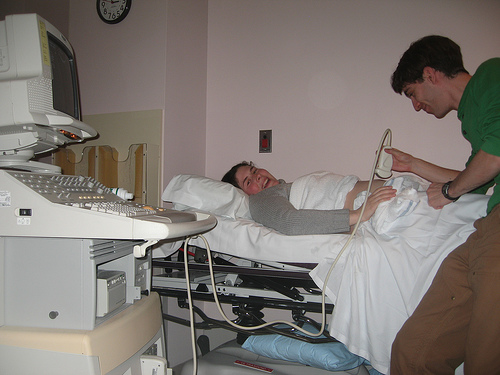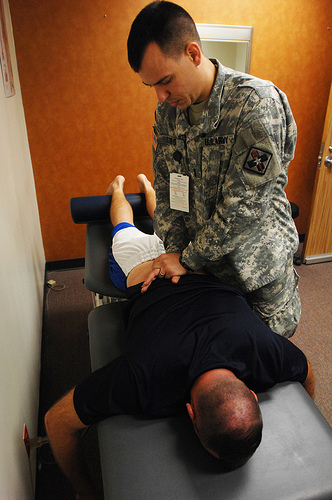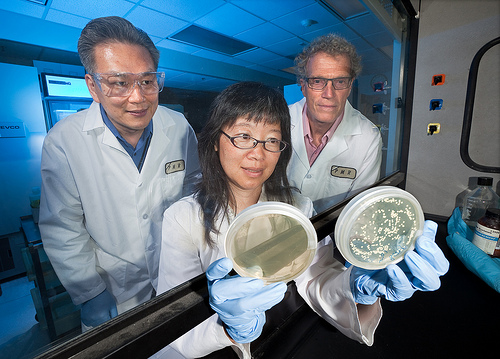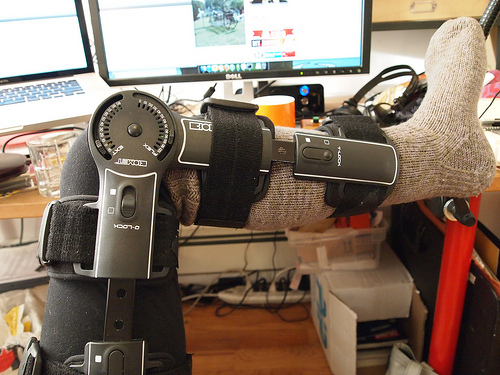
As technology becomes more integrated into the healthcare field, a whole new list of careers
is being created that deals specifically with the equipment being used. The days of the general practitioner are quickly being replaced by specialists that require years of schooling and experience. If you are looking for a career in the medical field but are not interested in being a doctor, then you still have a wide array of options to choose from.
Ultrasound Technician

Image via Flickr by redjar
When ultrasound was first developed, it was used mostly for checking the progress of a baby
during pregnancy. These days, ultrasound is used for everything from examining muscle tissue to treating sore backs and joints. You may also hear this job referred to as a medical sonographer as well. It all refers to the same type of equipment utilizing the same processes.
Physical Therapist

Image via Flickr by Army Medicine
Some of the most interesting advances in medical technology are being used by physical
therapists. These are the specialists that help people restore the use of their extremities and find ways to manage pain after an accident or illness. Electronic equipment used to stimulate muscles and sonograph equipment that can help reduce pain is just some of the technology being used by physical therapists.
Pharmacist

Image via Flickr by DavidDennisPhotos.com
Not only does being a pharmacist allow you to come into contact with the latest in medical
software, but it is also a fulfilling career that can pay quite well. Some people start their careers in pharmacy by getting involved in some of the getarealdegree.com nurse practitioner programs available online. Training as a nurse allows a budding pharmacist to understand how medications are used to treat conditions in real-life settings. This can be invaluable experience when it comes time to become a fully certified pharmacist.
Laboratory Technician

Image via Flickr by USDAgov
One of the more fascinating technology jobs in the medical field is that of laboratory technician. It can take years to become an experienced technician, simply because of the amount of equipment you must become familiar with. This is a position that requires familiarity with everything from a highly complex electron microscope to the latest in computer programs. It requires advanced knowledge in fields such as math, chemistry, biology and computer science.
Medical Appliance Technician

Image via Flickr by Bekathwia
A medical appliance technician fits and maintains artificial limbs and support braces. The
technology used in this field is evolving each year and it requires ongoing training to stay up to date with all of the newest innovations. Not only does this position require extensive knowledge of complicated equipment, the processes of creating artificial limbs and braces are also quite complex.
Getting into the medical field does not always mean being a doctor. There is a wide variety of
technical occupations in healthcare that can be fulfilling and fascinating. A good place to start is to get involved in an online nurse practitioner program as nurses are often asked to be able to use and understand a broad spectrum of complicated equipment. When you have a grasp of practical applications for medical technology, it becomes easier to get involved in a more focused profession.
Hi! I just wanted to write & let you know how much I really enjoyed reading this article on the best 5 degrees that prepare you for jobs using medical technology. I work in healthcare & I have learned how important it is to be educated in technology. Not enough of us are, and the future of healthcare is in technology. So, thanks for posting this important article. Thanks!
You’re welcome and you’re right – technology is the future of healthcare. It’s been going in that direction for years and is becoming even more intricate. Thanks for sharing your thoughts!
FYI – while you are correct that these are fields requiring fewer years of schooling than an MD, they are professions requiring extensive education and training – which I’m sure you know, but just thought I should point out lest anyone think these are quick options! 🙂
One good thing Ive found about going into allied health professions is that once you start going to school, if you decide to do something else in healthcare, you are still required to get the same classes, so you don’t have to make too many changes.
Thank you! Thank you! Thank you! From a professional financial executive of 20+ years, I don’t know how many times I’ve said to parents: you DO NOT need to pay for a “hoity toity” university education. Have your kids attend a local college for their BA/BS and then focus on a STEM career, even if it is an “allied” one – there are jobs! You can’t say that for many professions.
We still need doctors 🙂 but these are great alternative if you do not want the years and years of schooling…however, if I remember correctly, being a pharmacist is many years of school too 😉